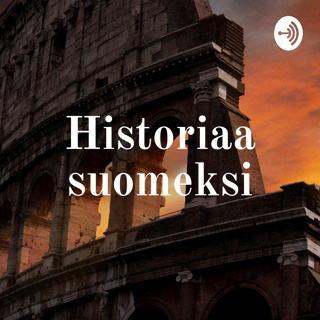
The Sacred Band of Thebes
The Theban Sacred Band was one of the greatest military corps of Ancient Greece, thriving from the city-state of Thebes for almost 50 years in the mid 4th century BC. In addition to their fighting prowess, however, there is another fascinating aspect to their history; this 300-man elite corps was made up of 150 pairs of male lovers, many of them buried side by side where they fell in battle. To hear more about this, Tristan spoke to James Romm, author, reviewer, and James H. Ottaway Jr. Professor of Classics at Bard College in Annandale, New York. James gives us a glimpse of Theban democracy, power struggles between leading city-states, and the growth of eros, sexual love, in Greek public life. His book ‘The Sacred Band’ is out now. Hosted on Acast. See acast.com/privacy for more information.
29 Heinä 202129min

The Begram Hoard: Treasures of the Silk Road
In the mid-20th century French archaeologists came across a remarkable collection of ancient items from Eastern China, the Indian subcontinent and the Roman Mediterranean, all in one place. In this second episode about Begram, Tristan is once again joined by the University of Freiburg’s Lauren Morris, who takes us into the details of the lacquerwares, ivory furniture, bronzes and glassware. Lauren and Tristan then explore what the hoard tells us about the global nature of this area in Central Asia during its golden age in the 1st - 4th centuries AD. Hosted on Acast. See acast.com/privacy for more information.
27 Heinä 202145min

Decoding the Roman Dead
Often known as ‘Britain’s first town’, Colchester is a city rich in ancient history and on 24 July 2021, a new exhibition will open at the Colchester Museum revealing more about some of its earliest Roman occupants. Called ‘Decoding the Roman Dead’, the exhibition focuses around cremations found in the area around Colchester dating to almost 2,000 years ago. Thanks to new scientific methods, the team have been able to analyse these burnt remains and find out some astonishing details about who these people were. From gender to pathology to where in the Roman Empire these people came from. To talk all about the new exhibition, and to shine a light on the wealth of information archaeologists can learn from ancient cremations, Tristan chatted to Dr Carolina Lima and Glynn Davis. Carolina and Glynn are two of the curators of the exhibition.To find out more, visit their website: https://colchester.cimuseums.org.uk/dtrd/ Hosted on Acast. See acast.com/privacy for more information.
25 Heinä 202144min

Life in Sparta
A legendary city-state in Ancient Greece, we associate Sparta with fierce warriors in battle. But what about the everyday? In this second episode with Professor Stephen Hodkinson, we discuss the eating habits, training and even kingship of Sparta. Stephen is Emeritus Professor of Ancient History at the University of Nottingham.Part 1 - The Truth About Spartan Society: https://podfollow.com/the-ancients/episode/f08dc2f18e4fabe1ecf7ee5bd91d88bc44b2f2b2/view Hosted on Acast. See acast.com/privacy for more information.
22 Heinä 202124min

The Oldest Known Shark Attack
It’s a crossover with Jaws and Open Water that we never expected, but a 3,000 year old corpse has thrown a surprising topic into the mix: shark bites. The body, found in the prehistoric Tsukumo hunter-gatherer burial site in Japan, unexpectedly presented evidence of traumatic injuries compatible with a shark bite, making it the earliest known victim of a shark attack. Following this discovery, Tristan spoke to Alyssa White from the University of Oxford. Alyssa was part of the team who studied body No. 24. She explains how they came across No. 24, the evidence which led them towards the cause of death, and the archaeological science and forensic techniques used to recreate the misfortune of this early shark victim. Hosted on Acast. See acast.com/privacy for more information.
20 Heinä 202127min

The Romans in Brittany
It was one of the most powerful empires in history, leaving marks and remnants across the globe, but in this episode we are looking specifically at the impact of the Romans on Brittany. Tristan was joined once again by Sir Barry Cunliffe, who takes us through the Roman occupation of Brittany, the response of the residents, and the impact on both cultures. From slaves and wine, to fish sauce and rebellion, this is an intriguing look into the character of Brittany and the realities of a Roman occupation. Emeritus Professor at the University of Oxford, Sir Barry Cunliffe is the author of Bretons and Britons: The Fight for Identity. Hosted on Acast. See acast.com/privacy for more information.
17 Heinä 202136min

Scythed Chariots
What could be more terrifying than an army racing towards you? An army on chariots? What if those chariots had blades mounted on either side? In this episode, Tristan speaks to Dr Silvannen Gerrard about the use of this unconventional mode of transport during the Hellenistic period, particularly by the Seleucid Empire. They discuss the benefits and difficulties of using these chariots, and how they fit in with other unusual modes of troop transportation, from war-elephants to camel-archers. Silvannen is an Ancient Historian at the University of Manchester. Hosted on Acast. See acast.com/privacy for more information.
15 Heinä 202159min

Carthage vs Greeks? The First Sicilian War
480 BC is a year widely-celebrated in Greek history. When Leonidas' Spartan core and their Hellenic allies fought a powerful Persian army at Thermopylae, and an outnumbered, Athenian-led navy defeated a mighty Persian armada at Salamis. Yet it was not just off the coast of Athens that one of antiquity’s most well-known battles was fought that year. 600 miles to the west of Salamis, supposedly on the same day the naval engagement occurred, another battle was fought: the Battle of Himera. In this episode, Ancient World Magazine's Dr Joshua Hall talks us through the battle and highlights why it was so significant in the story of ancient Sicily. Hosted on Acast. See acast.com/privacy for more information.
13 Heinä 202147min





















